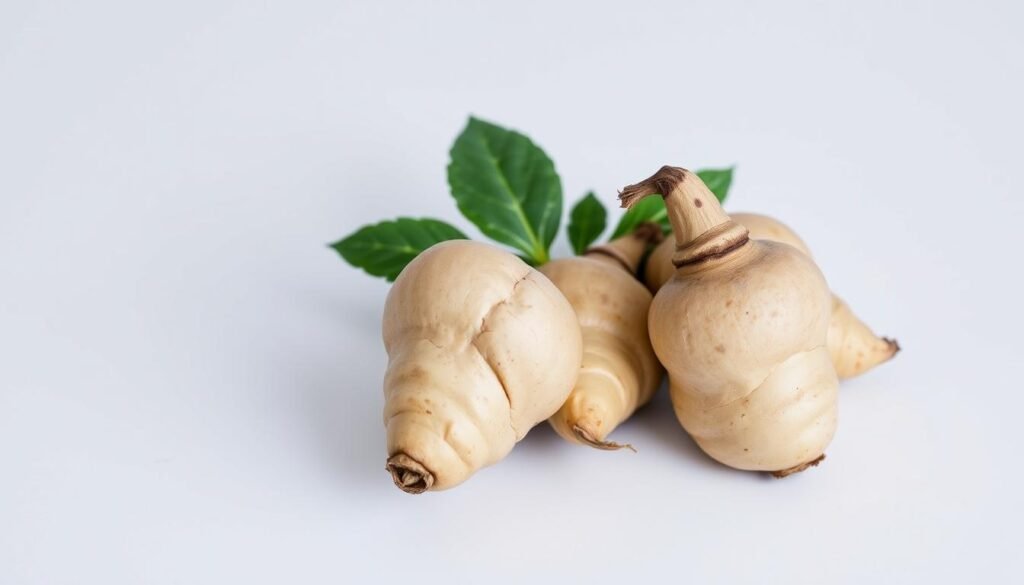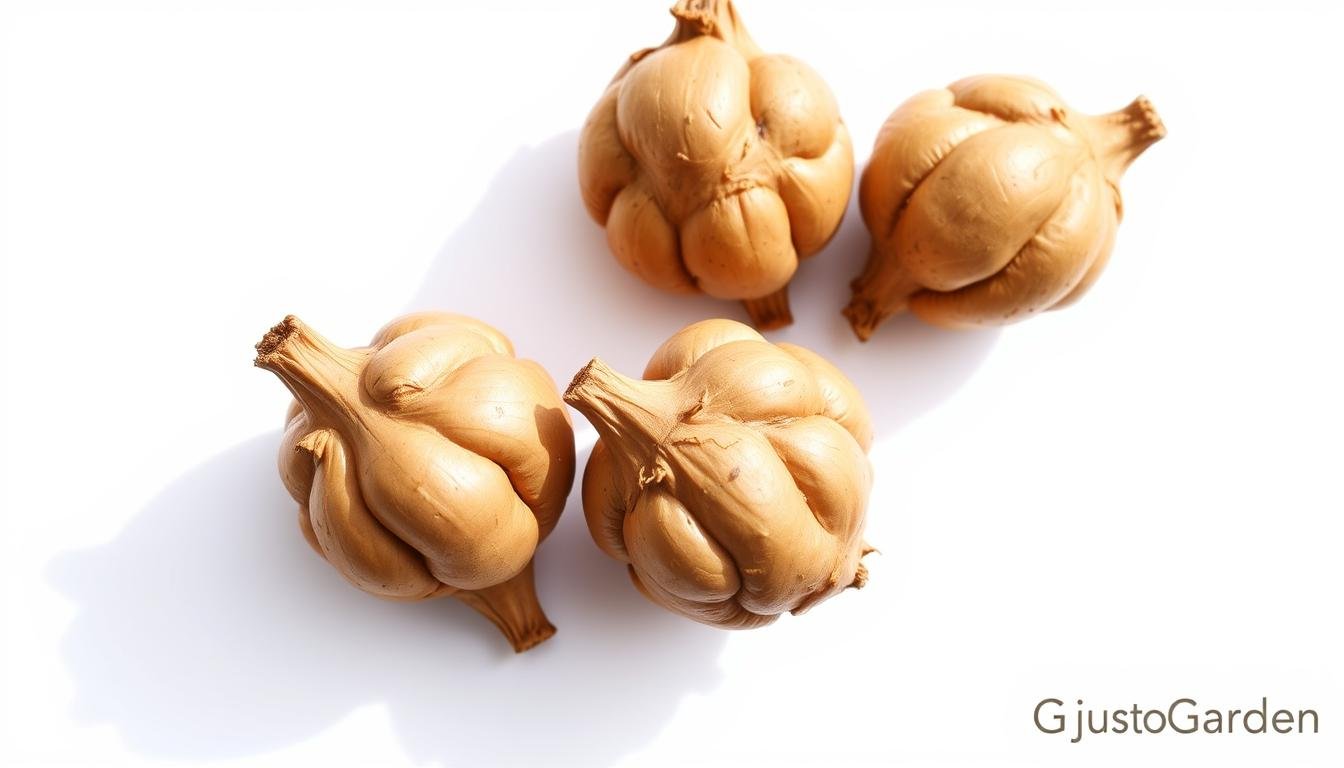I love exploring new foods, and sunchokes, or Jerusalem artichokes, are fascinating. These roots are full of nutrients and taste great. They look like potatoes but taste differently. Let’s dive into the unique flavors of sunchokes and how they compare to potatoes1.
Key Takeaways
- Sunchokes have a unique, nutty flavor that can be compared to a cross between potatoes and artichokes.
- Sunchokes are not as starchy as potatoes and have a more delicate, vegetable-like taste when properly cooked.
- Sunchokes are versatile in the kitchen and can be prepared in a variety of ways, including roasting, frying, and pickling.
- Sunchokes are packed with nutrients like fiber, vitamin C, iron, and potassium, making them a nutritious addition to your diet.
- Some individuals may experience digestive discomfort from the high fiber content in sunchokes, so it’s best to introduce them gradually.
What Are Sunchokes?
Exploring the Origins and Characteristics of Sunchokes
Sunchokes, also known as Jerusalem artichokes, are like potatoes but edible tubers. They were introduced to Europe by indigenous peoples from the Americas2. These rhizomes, with their knobby, pale color, are actually sunflower family stems, not roots2.
They taste nutty and savory, like a mix of artichoke hearts and potatoes2. Sunchokes look like large knobs of ginger but taste different. They’re great for adding a unique flavor to dishes2.
They’re not common in regular supermarkets but can be found at farmers’ markets or specialty stores2. You can eat them raw for crunch in salads or cook them in many ways2.
Their skins are edible and add an earthy taste, but some find them stringy2. Sunchokes have inulin, which can cause gas and bloating, especially raw2. The inulin content varies, affecting people differently2.
“Sunchokes are a unique and versatile ingredient that can add a delicious, nutty flavor to a variety of dishes. Their distinctive characteristics make them a fascinating addition to any kitchen.”

Sunchokes come from North America and were first grown by Indigenous Americans2. They have a unique look with a crinkled, thin skin and a soft, creamy inside2. They’re mainly in season in winter but can also be enjoyed in spring and autumn2.
Do Sunchokes Taste Like Potatoes?
Sunchokes, also known as Jerusalem artichokes, have a unique taste. They are sweet and nutty, similar to artichokes1. Unlike potatoes, sunchokes are less starchy and have a creamy texture1. Their flavor can also remind you of jicama or water chestnuts, depending on how they’re cooked2.
While you can cook sunchokes like potatoes, their taste is distinct2. They have a nutty, artichoke-like flavor that’s different from potatoes1. This makes them a great choice for those wanting to try something new3.
Sunchokes contain inulin, which can cause gas and bloating in some2. The amount of inulin can vary, affecting people differently2. Cooking them properly and eating them in moderation can help you enjoy their unique taste and benefits3.
| Characteristic | Sunchokes | Potatoes |
|---|---|---|
| Flavor | Nutty, artichoke-like | Starchy, neutral |
| Texture | Delicate, creamy | Firm, dense |
| Starch Content | Lower | Higher |
| Preparation Methods | Boiling, roasting, frying | Boiling, roasting, frying |

In conclusion, sunchokes are different from potatoes in taste and texture. They offer a unique experience for those looking to try something new. By understanding their distinct qualities, you can explore their culinary uses and enjoy their unique flavors123.
Sunchokes Flavor Comparison
Nutty, Artichoke-Like, or Something Else?
Sunchokes, also known as Jerusalem artichokes, have a unique flavor. Many say they taste like a mix of nuts and artichoke hearts, with a hint of sweetness4. Others find them similar to jicama or water chestnuts in taste4.
Compared to potatoes, sunchokes are creamier and have a more complex flavor4. When cooked right, their sugars caramelize, making them even sweeter and nuttier4.
| Flavor Comparison | Description |
|---|---|
| Nutty | Sunchokes have a delicate, nutty quality, similar to artichoke hearts. |
| Artichoke-Like | The flavor of sunchokes is often compared to that of artichokes, with a slight sweetness. |
| Jicama or Water Chestnuts | Some describe the taste of sunchokes as resembling the crisp, refreshing flavor of jicama or water chestnuts. |
To enjoy the sunchokes flavor profile, roast them with oil, red pepper flakes, thyme, lime juice, salt, and pepper4. This method highlights their natural sweetness and nuttiness4.
“Sunchokes have a more delicate, creamy texture compared to potatoes, and their flavor is generally more nuanced and complex.”
Whether you think sunchokes taste like artichokes, nuts, or something else, they’re definitely unique. Discover more ways to use them in your cooking and see their versatility4.
Sunchokes vs Potatoes: A Taste Showdown
Sunchokes and potatoes are often confused with each other. But they have very different tastes. Sunchokes have a nutty and artichoke-like flavor, unlike potatoes’ starchier taste5. Sunchokes are also creamier and more delicate than potatoes5.
The origins of these vegetables are also different6. Potatoes were first grown by the Incas in Peru thousands of years ago6. Sunchokes, also known as Jerusalem artichokes, come from North America5. This difference in origin adds to their unique tastes.
Cooked sunchokes are sweeter and nuttier, offering a nice contrast to potatoes’ earthy taste5. Sunchokes are also packed with iron, potassium, and thiamin. Potatoes, on the other hand, are more filling and have more protein5.
Choosing between sunchokes and potatoes depends on what you like and what you’re making7. Whether it’s mashed potatoes or a sunchoke dish, both offer exciting flavors and textures5.
| Characteristic | Sunchokes | Potatoes |
|---|---|---|
| Flavor Profile | Nutty, artichoke-like | Starchy, more neutral |
| Texture | Creamy, delicate | Hearty, dense |
| Nutrient Comparison | Rich in iron, potassium, thiamin | Higher in protein, provide sense of fullness |
| Origins | Native to North America | First cultivated by Incas in Peru |
| Availability | Specialty item, found at farmers’ markets | Widely available year-round, staple food crop |
In the taste battle between sunchokes and potatoes, it’s clear they offer unique flavors. While potatoes are a favorite, sunchokes offer a special taste for those looking to try something new5.
Cooking with Sunchokes
Sunchokes, also known as Jerusalem artichokes, are versatile veggies. They can be roasted, sautéed, or added to soups and purees. These tubers are rich in iron, potassium, and fiber, making them a healthy choice8.
Versatile Recipes and Preparation Methods
Sunchokes can be enjoyed raw, roasted, fried, or steamed8. They go well with butter, parmesan, parsley, garlic, and more9. Roasting them is simple: just toss with olive oil, salt, and pepper, then roast at 425 degrees for 20 minutes8.
They can also be pickled, made into gnocchi, or added to soups and purees8. Their flavor is nutty and sweet, with a creamy texture. This makes them great for both veggie and meat dishes9. Plus, they’re in season from late fall to early spring, making them easy to find8.
However, sunchokes are high in inulin, which can cause stomach issues in some8. To avoid this, remove most of the peel before roasting. Start with small servings to see how you react8.
| Sunchoke Preparation Method | Description |
|---|---|
| Raw | Sunchokes can be enjoyed raw, sliced or grated, in salads or as a crunchy snack. |
| Roasted | Toss sunchoke slices or wedges with olive oil, salt, and pepper, then roast at 425°F for 20-30 minutes. |
| Fried | Slice sunchokes into thin rounds or sticks and fry in hot oil until golden and crispy. |
| Steamed | Steam sunchoke chunks until tender, then toss with butter, herbs, or other seasonings. |
| Pureed | Boil or steam sunchokes, then blend into a creamy, velvety soup or mash. |
Sunchokes offer a unique flavor and many ways to cook them. They’re great for roasting, sautéing, or adding to your favorite dishes. These nutritious tubers are a wonderful addition to any kitchen89.
Sunchokes Nutritional Value
Sunchokes, also known as Jerusalem artichokes, are a versatile and nutritious vegetable. They are unique in flavor and packed with essential vitamins, minerals, and other beneficial compounds10.
One cup (150g) of sliced sunchokes has only 110 calories, with no fat and 3g of protein10. They contain 26g of carbs, including 2.4g of fiber and 14g of natural sugars10. Their real nutritional value comes from their rich content of essential nutrients.
Sunchokes are a good source of calcium (21mg), potassium (644mg), phosphorus (117mg), vitamin C (6mg), beta carotene (18 µg), zinc (0.18mg), and copper (0.21mg)10. They may help lower cholesterol and improve bone health10. They also contain inulin, a prebiotic fiber that aids digestion and boosts immunity10.
| Nutrient | Amount per 1 Cup (150g) Serving |
|---|---|
| Calories | 11010 |
| Fat | 0g10 |
| Protein | 3g10 |
| Carbohydrates | 26g10 |
| Fiber | 2.4g10 |
| Sugars | 14g10 |
| Calcium | 21mg10 |
| Potassium | 644mg10 |
| Phosphorus | 117mg10 |
| Vitamin C | 6mg10 |
| Beta Carotene | 18 μg10 |
| Zinc | 0.18mg10 |
| Copper | 0.21mg10 |
Sunchokes are a great addition to a balanced diet. They offer a unique flavor and many health benefits. Adding them to your meals can boost your overall well-being.
Health Benefits of Sunchokes
Exploring the Nutritious Side of Sunchokes
Sunchokes are more than just a tasty treat. They are packed with vitamins and minerals like vitamin C, iron, and potassium11. This makes them a great choice for anyone looking to eat healthier.
They are low in calories but high in fiber, which is good for your health12. The inulin in sunchokes helps keep blood sugar levels stable. It also makes you feel full and supports regular bowel movements12. Plus, they help grow good bacteria in your gut, which is good for your weight and immune system12.
In places like Piemonte, Italy, sunchokes are a common food11. They can be cooked in many ways, like braising, roasting, or sautéing12. With their rich nutritional profile and health benefits, sunchokes are a great vegetable to add to your diet.
“Sunchokes are a nutritious and versatile vegetable that offer a range of health benefits, from supporting digestive health to maintaining blood sugar levels.”
Sunchokes Cooking Tips
When cooking sunchokes, remember a few key tips for the best results. Sunchokes should not be cooked in aluminum or cast-iron. This can make them turn gray because of oxidation13. To prevent browning, soak them in water with vinegar or lemon juice if you’re serving them raw14.
Roasting sunchokes at high heat brings out their natural sweetness and nutty taste. The heat caramelizes the sugars, making them crispy on the outside and creamy inside15. You can also pickle them, bake them in a gratin, or add them to gnocchi for a unique flavor14.
Preparation is simple: just wash them in cold water and cut them to the right size for your recipe15. Some people peel sunchokes for certain dishes, like purees. Others don’t bother15. Roasted sunchokes with parmesan and fennel are a tasty side dish that’s great all year15.
Whether you’re new to sunchokes or have cooked them before, these sunchokes cooking tips will help you enjoy them more. With the right preparation and cooking method, you can savor their unique flavor and health benefits13.
The Name Game: Sunchokes or Jerusalem Artichokes?
Unraveling the Confusion Behind the Names
Exploring the world of this unique root vegetable can be confusing. You might see “sunchokes” and “Jerusalem artichokes” used interchangeably. Sunchokes are also called “Jerusalem artichokes,” which can lead to confusion. The name “Jerusalem” likely comes from a mispronunciation of “girasole,” the Italian word for sunflower16.
The name “artichoke” comes from a French explorer who thought it tasted like an artichoke17. But sunchokes are not from Jerusalem or related to artichokes. They are a unique North American tuber in the sunflower family18.
Sunchokes are actually a type of sunflower, not an artichoke18. They grow up to 6 feet tall and have a yellow flower above ground. Native Americans grew them before Europeans arrived in North America. They later became popular in Europe18.
In the United States, they are called sunchokes, while in Italy, they are “topinambur.”16 Sunchokes are versatile and nutritious, with a flavor that can be nutty or artichoke-like17. As you explore this root vegetable, enjoy the variety of names and the unique flavors they offer.
FAQ
Do sunchokes taste like potatoes?
Sunchokes look like potatoes but taste differently. They have a nutty sweetness, like artichokes, and a creamy texture. This is unlike potatoes, which are starchier and denser.
What are the key differences in taste between sunchokes and potatoes?
Potatoes taste neutral and starchy. Sunchokes, on the other hand, have a nutty flavor and a hint of artichoke. They are creamier and more delicate than potatoes.
How would you describe the unique flavor of sunchokes?
Sunchokes taste subtly sweet and nutty, similar to artichokes. They also remind some of jicama or water chestnuts. Cooking them brings out their natural sweetness and nuttiness.
How can sunchokes be prepared and used in cooking?
Sunchokes are very versatile. You can fry, steam, sauté, boil, mash, roast, slice, or eat them raw. They go well with butter, parmesan, garlic, and more. Use them as a side, in soups, or even make gnocchi.
What are the health benefits of sunchokes?
Sunchokes are packed with nutrients like vitamin C, iron, and potassium. They’re also high in fiber. This makes them a great addition to a healthy diet.
What is the difference between sunchokes and Jerusalem artichokes?
Sunchokes and Jerusalem artichokes are the same. The “Jerusalem” name likely comes from a mix-up with “girasole,” the Italian word for sunflower. Despite their name, they don’t taste like artichokes but are often compared to them.
Source Links
- https://www.mashed.com/425124/what-are-sunchokes-and-what-do-they-taste-like/ – What Are Sunchokes And What Do They Taste Like? – Mashed
- https://www.thespruceeats.com/what-are-sunchokes-3376827 – Are Sunchokes the Same as Jerusalem Artichokes?
- https://www.myvegtableblog.com/tidbits/a-bit-of-sunchoke/ – A Bit of Sunchoke… – My Veg Table
- https://www.a-brownian-walk-through-life.com/2010/03/jerusalem-artichokes-sunchokes.html – Jerusalem artichokes (sunchokes)
- https://www.savorysuitcase.com/jerusalem-artichoke-vs-potato/ – Jerusalem Artichoke vs Potato: A Comprehensive Comparison
- https://www.foodstoragemoms.com/potatoes-everything-you-need-to-know/ – Potatoes: Everything You Need to Know
- https://www.goodfoodrevolution.com/prepared-foods-living-the-vida-local/ – Prepared Foods – Living The Vida Local
- https://www.abeautifulplate.com/roasted-sunchokes/ – Roasted Sunchokes
- https://hummingbirdthyme.com/roasted-sunchokes-with-basil-and-mint/ – Roasted Sunchokes with Basil and Mint – Hummingbird Thyme
- https://www.stylecraze.com/articles/what-are-sunchokes/ – Sunchoke: Nutrition Facts, Benefits, And How To Prepare
- https://annamariasfoods.com/health-benefits-of-sunchokes-jerusalem-artichokes-recipe/ – Health Benefits of Sunchokes
- https://www.eatingwell.com/article/8009707/what-are-sunchokes/ – What Are Sunchokes?
- http://texasovenco.com/roasted-sunchokes/ – Sunchokes as wood-fired appetizer – Texas Oven Co.
- https://www.platingsandpairings.com/sunchokes/ – Easy Roasted Sunchokes
- https://chefcindy.com/roasted-sunchokes-lemon-thyme/ – Roasted Sunchokes with Lemon & Thyme
- https://allthingssicilianandmore.com/tag/sunchokes/ – NOT JUST A PRETTY PLANT – SUNFLOWERS AND JERUSALEM ARTICHOKES – All Things Sicilian and more
- https://www.learningwithexperts.com/foodanddrink/blog/jerusalem-artichokes – Jerusalem Artichokes
- https://stacylynharris.com/jerusalem-artichoke-aka-sunchoke-a-survival-plant/ – Jerusalem Artichoke, aka Sunchoke: a Survival Plant

